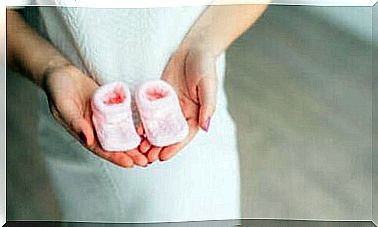Irregular Menstruation After Birth

After birth, the body will need time to adjust, recover and return after the 9 months of changes it has been through.
Menstrual changes, and the time it takes before you get your first period after giving birth, can vary from woman to woman. These changes are completely normal and there is nothing to worry about.
How should the first menstrual cycle be after birth?
The first period after birth can take up to 5 or 6 months before it comes. In some cases, it can take up to a year.
This delay is due to the changes that the body has been through and is still going through.
Therefore, it is possible to:
- Your first period may be more painful and abundant than those you experienced before pregnancy.
- It can occur before the premenstrual syndrome, which can cause vomiting and less dizziness.
- You can have secretions. Secretion is a type of bleeding that is made up of mucus and tissue that was inside the uterus during pregnancy.
Your first 2 or 3 periods after birth may be abundant according to the amount before returning to normal.
Occasionally, gynecological problems, such as ovarian cysts and endometriosis, may be resolved during and after birth.
Irregular menstruation while breastfeeding
Menstrual changes occur differently in women and they depend to a large extent on the woman’s hormonal and physical composition, as well as whether breastfeeding is maintained or not.
Breast-feeding is associated with an increased production of prolactin. Prolactin is the hormone responsible for menstrual disorders.
Women who are breastfeeding may have delays of up to 5 months before having their period again.
Women who are not breastfeeding can have their period 2 months after giving birth.

Although you may not get that period while breastfeeding, circumstances may vary and some women may go through an irregular menstrual phase.
Many women do not have the same symptoms when they get their first period after pregnancy. Some suffer from dizziness, nausea and swollen limbs.
This variation of symptoms may be associated with the mother’s milk production, which raises and lowers the level of prolactin.
Can I get pregnant while having irregular periods after giving birth?
Even if one experiences irregular menstruation after giving birth, a woman may still become pregnant as ovulation still occurs.
You can even release your first egg after giving birth, without discovering it. It can happen as early as 2 weeks after you give birth.
The degree of fertility is dramatically low after giving birth. Even if the fertility level is low, keep in mind that it is not zero.
Breastfeeding and missed periods are only effective 98% of the time if all the rules are followed during the first 6 months after giving birth.
Keep in mind that irregular menstruation after childbirth can start to normalize after 6 months.
8 practical suggestions for normalizing his menstruation after giving birth
The menstrual cycle is normalized after a few months. However, there are some things you can do to help regulate your period:
- Have a balanced diet rich in minerals and nutrients.
- Do light exercise.
- Drink plenty of water and fruit juices throughout the day.
- Do not drink alcoholic beverages.
- Rest as it suits you.
- Do not smoke.
- Try to be stress free.
- Avoid junk food.

Do not worry about your period. Continue your day as usual and enjoy your motherhood.
The most important thing to know is that your first menstrual period after giving birth is a sign that your reproductive system is returning to its normal cycle.
This occurs even though your ovaries have experienced significant changes.
It can take several months for your period to return to the characteristics it had before you became pregnant.
If other problems occur, such as persistent, heavy bleeding, consult your gynecologist so they can evaluate and treat the problem as they see fit.









